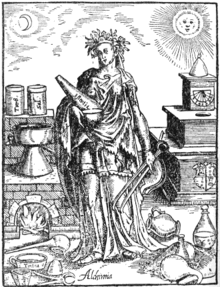Our website is made possible by displaying online advertisements to our visitors.
Please consider supporting us by disabling your ad blocker.
Alkahest

In Renaissance alchemy, alkahest was the theorized "universal solvent".[nb 1] It was supposed to be capable of dissolving any composite substance, including gold (then not considered an element), without altering or destroying its fundamental components.[1] By extracting from composite substances their fundamental virtues and properties, alchemists hoped to gain control of invaluable medical healing properties (see also azoth). For this reason the alkahest was earnestly sought. At the same time, its very existence was debated among alchemists and philosophers.
The first, or one of the first, to mention the alkahest was the Swiss physician and alchemist Paracelsus.[2]
Cite error: There are <ref group=nb> tags on this page, but the references will not show without a {{reflist|group=nb}} template (see the help page).
- ^ Panzarasa, Guido (2015). "Rediscovering pyrotartaric acid: a chemical interpretation of the volatile salt of tartar" (PDF). Bulletin for the History of Chemistry. 40: 1–8 – via IsisCB.
- ^ Paracelsus, Philippus Theophrastus (1572). Zwen Tractatus. I. De viribus membrorum spiritualium. II. De electro: Mit Erklärung ettlicher Wörter und Praeparationum. Jobin, Bernhard. p. 10.
Previous Page Next Page


